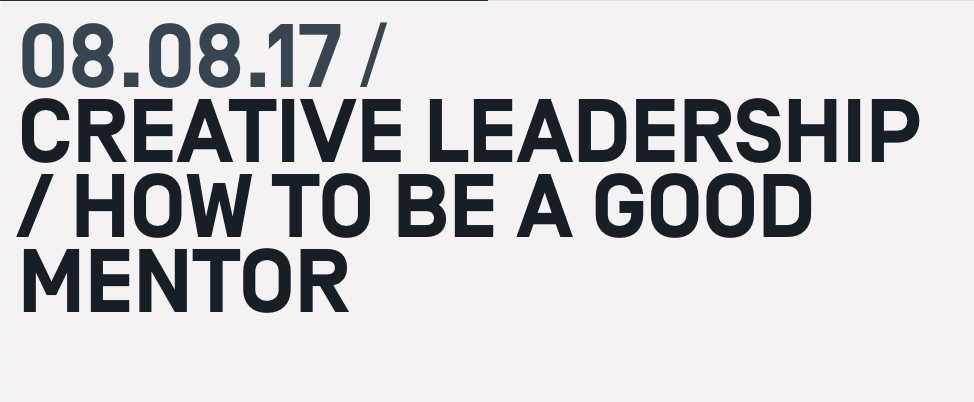CREATIVE LEADERSHIP

CREATIVE LEADERSHIP / HOW TO BE A GOOD MENTOR
"The delicate balance of mentoring someone is not creating them in your own image, but giving them the opportunity to create themselves."
— Steven Spielberg
If you're considering to grow towards any type of leadership role in your career, you're going to need to understand how to be a good Mentor.
I believe the role of a good leader is to create good leaders.
This might sound like a cliche — so be it.
I also believe that the road towards a purposeful career is mentorship — on both sides. If you're seeking to grow, seek out a Mentor. If you're seeking to grow even more, be a Mentor yourself.
By imparting your knowledge you will see yourself from a completely new aspect — and irrespective of your experience, there is always someone less experienced than you).
I was ten years into my own career before I considered mentoring someone — and now I've been mentoring young and emerging people in the creative industries for the last 17 years.
Why young men and women?
Because young women are often overlooked in our industry — just try and create a list of female creative leaders and let me know if you come up with more than 10.
And young men who have grown up in backgrounds that don't necessarily support a creative career have also been my focus, mainly due to the similarities with my own background and the fact that opportunities for guidance and mentorship aren't rife in certain parts of the world.
So, as you grow towards your own version of Creative Leadership, I hope you'll mentor many younger people for no other reason than to help them grown.
But I urge you to tread carefully.
IT'S YOUR TIME
You're about to embark on something that will take away time from your other endeavours.
Are you sure about this?
Be clear with yourself when it comes to the Mentor / Mentee relationship you're about to embark on. Don't kid yourself that it will be easy or that you won't have to prepare anything in advance.
There is another person in this relationship and they're going to depend on you to be in the driver's seat.
So be prepare to drive.
HOW TO CHOOSE CAREFULLY
Before you take on a Mentee, you must be able to select with care simply because there are many people out there who will waste your time.
They won't bring what is needed to get the most out of their experience.
I've created a set of simple guidelines which are helpful when I'm selecting people whom I mentor. When I interview potential Mentees, I look out for these characteristics as clear signs that this person simply doesn't cut it:
- They expect the relationship to go on and on.
- They lack curiousity and expect everything to be given to them.
- They want to do the whole thing their way.
- They expect a job at the end of it.
- They don't do any of the tasks you give them.
- They lack professionalism. They're consistently late, no concept of time and don't know how to run or participate in a meeting.
- They can't take feedback. They say they can, but each time you give them feedback they blush and give you 'reasons' why.
- They lack commitment. Their heart just isn't in it.
- They don't invest in themselves. They don't read, explore or tinker on anything to teach themselves something new.
- They procrastinate and always put things off.
I look for these characteristics in people who I'm considering — they are clear signs of people who will lack the commitment of learning the very simple things before they think they're ready to jump into more complex things.
Some might say that some of the above characteristics (professionalism, an appetite to teach oneself something, learning to take feedback) are what a Mentee will learn in a Mentor/Mentee relationship.
And this is true. Maybe they will. But I expect a potential Mentee to arrive to the relationship with these basic skills:
- Basic professional etiquette.
- A proven appetite to teach themselves something new (ie. they're already self learning!)
- They can take, and give, constructive feedback.
- Curiousity. To be interesting, you have to be interested.
These are my guidelines and I urge you to create your own before embarking on your own journey.
THE RELATIONSHIP DYNAMIC
The best mentorship dynamics are not teacher/student, they're not parent/child and they're definitely not boss/employee.
Many Mentors get this wrong from the outset.
Being a Mentor isn't a chance to exercise some type of superiority complex nor should it be an abusive power trip.
Establish a dynamic of mutual respect and open, clear communication.
The best mentorships are an amicable friendship between likeminded and respectful individuals where one has some knowledge and experience to impart, and the other has an openness to learn and something to teach the Mentor through their learning as well.
Some have described a good Mentor/Mentee relationship akin to that of a parent and an older child over 40. Both are experienced, both have failed at something and both have something to teach one another.
A mutual respect, shared values and trust must exist between the two of you.
LEARN HOW TO RUN A MEETING
If you don't know how to run a meeting — don't be a Mentor.
You'll just waster your Mentee's (and your own) time.
- Make the goals of the meeting clear.
- Invite them with enough notice (at least 1 week in advance) and be clear as to when, where, how long and why.
- Stick to the schedule. Don't be late. In fact, be there early.
- Don't eat up time and then blame 'time running out'.
- Set a clear agenda.
- Start on time and end on time.
- Turn your phone off! If you answer your phone during a meeting, you're banned from the Internet forever.
- Set clear actions at the end. Tell them what you want them to do.
- Follow up.
THE MENTORSHIP TEAM
Good Mentors surround themselves with other people who also Mentor. A Mentorship Team if you will.
Most leaders in most industries are providing mentoring as part of their own growth and you'll find that most Executives, business owners and Creative Leaders are mentoring a group of people in some form or another.
The Mentorship Team allows you to swap stories, learn new ways of providing guidance and interest in your own mentoring.
It also provides you a group of other people to introduce your Mentee to. A team of experts in various fields that can flesh out the learning that you can't provide.
YOU DON'T HAVE TO KNOW EVERYTHING
Some people don't mentor simply because they feel they don't know 'everything' or 'enough' to be able to provide guidance or mentorship.
If you can consider someone who is now at a point you were a year ago, and you can consider yourself a mentor.
Mentorship Teams (above) provide you a dynamic to introduce your Mentee to other people who will act as type of Council for both you and your Mentee.
RUN IT TIGHT AND STREAMLINED
A mentor program has to be tight and streamlined. It has to have a clear framework, a beginning, middle and end.
It can't meander on forever and it can't lack any kind of structure.
Start with one, 1-hour meeting per month for three months and go from there.
DON'T CROSS BOUNDARIES
As with any relationship, there are boundaries. Don't cross them, or you'll find yourself in deep shit.
- Don't take credit for their ideas
- Don't get them to do your work
- Don't get them to do unpaid work
- Don't tie them to your timeline, they might grow faster than you. Suck it up.
- Don't discourage them from seeking out other Mentors.
- Don't abuse your position
- Don't break the law
END WITH A TRANSITION
At the end of your mentorship, as the Mentor in the relationship provide your Mentee with a transition.
Don't just stop and say goodbye.
A simple transition to the next thing provides value and establishes a reason for you both to stay in touch.
Here are some ideas:
- Introduce them to another Mentor
- Introduce them to one of your past Mentors
- Give them a freelance job
- Set up a series of meetings with people they're inspired by
- Give them a book/podcast/website list to read through
- Give them some tools to use in their work
- Invite them back for a meeting in a year's time to check on their progress
Enjoy.
Source: jimantonopoulos.com
Ref: www.agda.com.au
